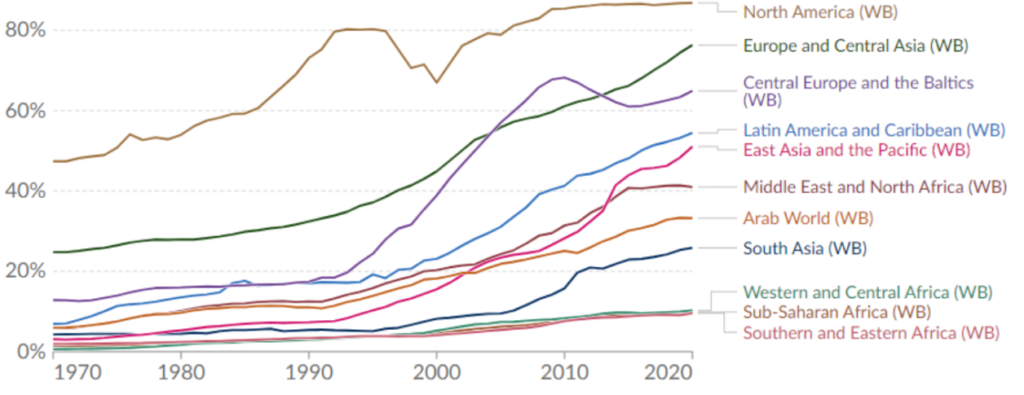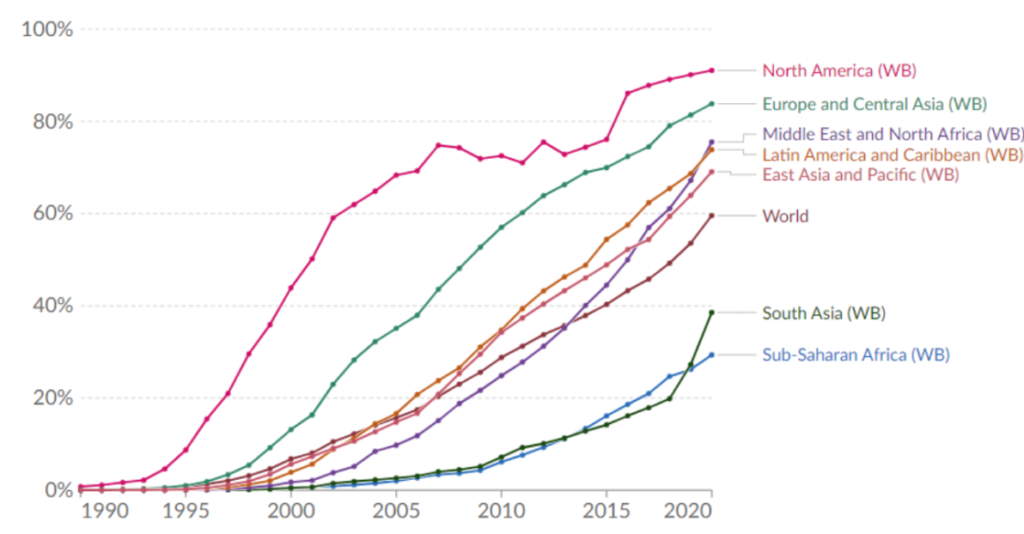Remote Work and the New Era of Globalisation

Key highlights
- Remote work will drive forward the latest wave of globalisation, which will keep increasing the share of services in global trade for the foreseeable future.
- Workers across the developing world are getting equipped with highly valuable skills that will push up their demand in a globalised labour market.
- There will be disruption for firms and workers everywhere, and those best able to retain competitive knowledge and skills will benefit the most.
A very brief history of globalisation
Starting from the Industrial Revolution in the 18th century, all the major waves of globalisation were based on the trade of goods. Broadly speaking, they moved from the trade of raw materials, textile manufacturing, large scale industrialization, to the emergence of global supply chains by the end of the 20th century. But starting from the internet boom of the 1990s, a new product began to be traded across borders: services. It includes knowledge industries like software development, consulting, design, marketing, and many others.
Despite the newfound ability, historically speaking, of companies to hire remote workers, the export of services still lags far behind the export of goods. The former accounts for only a quarter of total global exports, while the rest is all down to the latter. Before considering the future of services exports, and thus of remote work as well, it is instructive to identify the reasons why it has been held back so far. There have been three main ones.
First, the majority of services typically required on-site delivery. Unlike goods, they are not easily transported; the service provider and consumer both had to be in the same location. This is still true for some service industries, such as restaurants and hotels, where customers must be on-site to experience the service. This is less so the case with knowledge-based services such as communications and software, which make up 45% of the world’s service exports. Nevertheless, site visits were often the norm even with these services in the pre-pandemic era, reducing the competitiveness of their pricing.
The second constraint for service-oriented businesses is that they mostly require high-skilled labour. Industrial manufacturing primarily needed low-skilled (and low-cost) labour. As globalisation expanded and the outsourcing of manufacturing unfolded towards the end of the 20th century, factories in the West easily relocated to developing countries with abundant low-skilled labour. The services sector, however, requires mid- to high-skilled workers that until recently, were hard to find in sufficient numbers outside of North America and Europe.
Thirdly, the characteristics or quality of a service-based product are not easy to judge prior to purchase. Unlike goods that have a definitive value and quality, the same for services are more subjective. As we will see later, the first two challenges are being eased with technological and other improvements, but this will be more difficult to overcome. Although innovations like online freelance platforms are helping to increase transparency in cross-border service delivery, business-to-business transactions still face the prior judgement constraint.
Remote work and the new wave of globalisation
Services trade still lags behind goods overall, but the gap is closing quickly. Between 2008 and 2018, the export of services grew nearly 48%, a higher rate than the export of goods, which only grew 30% in that same decade. Remote work is now positioned to be the catalyst that unlocks the globalisation of services. As professional services are delivered remotely, costs will go down. The following are some of the major levers contributing to the growth of remote work, and therefore of the services industry.
- Growing rates of higher education. Probably the biggest structural factor that will accelerate remote work and the global trade of services in the future is the strong growth in tertiary education being experienced across the developing world. Although tertiary education attainment rates in the developed world are still much higher than in developing countries, the latter have been catching up rapidly since around 1990, as the figure below shows. This is a crucial development, as it is creating a growing pool of high-skilled workers in countries where wages are relatively lower compared to the developed world. This will allow for the expansion of services outsourcing, similar to how the outsourcing of manufacturing unfolded earlier.
Figure 1: Gross Enrolment Ratio in Tertiary Education, 1970-2020

- Broadband internet and online collaboration tools. With the advances of technology such as 5G broadband internet, video conferencing, augmented reality, virtual reality, and instant messaging, many jobs can be delivered remotely in a way that rivals the quality of on-site jobs. When remote jobs are at the same quality level as on-site jobs, there is a huge competitive advantage to source these services from countries where labour costs are lower.
Figure 2: Share of the Population Using the Internet, 1990-2020

- A globalised culture. Remote work is all about trust. The barriers to working with someone unknown and unproven are much higher than for a person you see each day. Thankfully, in today’s world we are more interconnected than ever before in history. The ease and low cost of mass international travel on the one hand, and the explosion of information technology and entertainment on the other, have allowed the intermixing of different national cultures. This makes it easier for remote workers in Asia, for example, to integrate with a team in the US, and vice versa.
- English is spoken everywhere. The English language is now spoken the world over, making it easier for teams from different geographies to collaborate. There are currently an estimated 1.5 billion English speakers worldwide, which is almost 20% of the world’s population. While the proficiency varies across geographies, it is generally improving with time, especially as tertiary education rates in developing countries go up.
The impact of remote work on developing countries
Since the continued expansion of remote work and the global trade in services will be driven by the greater participation of developing countries in the global economy, it is important to understand how these economies in general and their labour markets in particular will be impacted. This will have long term implications both for remote workers in developing countries, and their foreign employers or clients.
- Slowing down “brain drain”. Developing and emerging markets often experience brain drain, also known as human capital flight. It refers to the physical migration of skilled individuals from a developing country to a more developed one. When this occurs, that country generally loses its most talented and educated workers, to the detriment of the entire economy. This results in the shortage of skilled workers, lower entrepreneurial activity, and overall lower economic growth. Remote work, however, helps mitigate this problem by allowing skilled workers to stay in their home countries and work for companies in more developed markets. The effect is not entirely the same as if they were working for local companies, but the country can still benefit from their presence. They spend locally, pay taxes, remain part of the local community, and invest locally too. In addition, as services exporters, they positively contribute to the country’s trade balance.
- Higher demand for skilled talent. With remote work, anyone with the right skill set can theoretically find a job, and as we saw above, it therefore allows highly-skilled workers to remain in their home country. When companies from developed countries hire these individuals, they compete with offshore businesses for that talent, pushing up wages in the developing country. This is because now, both local and foreign employers are competing for the same set of professionals.
- Forcing innovation. In offshore destinations, the outsourcing services business model thus far has been simple: providing services at a lower cost than developed markets. However, this will not remain the case as remote work proliferates and communications technology continues to improve. While cost will remain a factor, companies will increasingly look to, and be able to, access higher quality service providers in developing countries. Thus, with rising wages and higher demand for the best-skilled workers in developing countries, companies in these markets will need to start paying higher wages to retain the best workers. But this will only be possible if these companies innovate, become more competitive, and create more value.
- Global wage convergence. The factors discussed so far will all serve to push up wages of skilled workers in developing countries, through different routes. But the expansion of remote work will also rationalise labour markets in developed countries, and help make the global labour market more equal. Essentially, remote work and cross-border hiring serves to expand the overall supply of workers for firms in developed markets, which will lower the premiums that skilled workers there are often able to charge. While some structural factors will remain, such as variable cost of living across countries, this dynamic will bring wages closer to their fair value in both developed and developing markets in accordance with demonstrable skill levels.
How will companies and skilled workers fare?
Change in the world economy is an ongoing process. The last major transformation was the globalisation of goods trade, with many companies moving their production bases to cheaper offshore locations, causing many manufacturing jobs to disappear in their home markets. Of course, for each job lost, there were multiple new jobs born. Additionally, in developed markets, workers stopped producing physical products, and instead more and more started performing ‘higher-value’ functions like management, design, and software development. Now, these types of jobs will increasingly shift to the developing world.
This change will have profound and long-term economic and social implications, which cannot be fully mapped out at this stage. However, we can discern how the two major stakeholders – firms and skilled workers – are likely to be affected in each type of market.
Companies in developed countries will be major beneficiaries. In the short to medium term, they will be able to hire the same level of skilled talent as in their home countries, but at a lower cost. Over time, as offshore wages rise, these firms will have to start paying more but they will also have a much larger labour pool to source talent from, allowing them to hire the best candidates. In particular, small and medium-sized firms will have a better chance of finding the better talent.
For skilled workers in the developed world, remote work is likely to be a mixed bag. In theory, hiring demand for them in the coming years is likely to moderate in some functions, due to lower wages offshore and the effect remote work is having in expanding the global labour supply pool. However, while premiums for these workers may be adjusted downward in the future, not all jobs will or can be outsourced to offshore locations. Coupled with the significant advantage of the quality of education and training that workers in developed countries enjoy over their counterparts in developing ones, the formers’ average wage level is unlikely to dip significantly anytime soon.
Firms in developing countries are probably going to have to face most of the disruption being caused in labour markets due to remote work and outsourcing. Not only will they have to compete with overseas firms willing to pay higher wages, but as discussed earlier, wages in their home markets will naturally tend to go up as well as offshore hiring continues to grow. This will make some firms more competitive and innovative, but will also leave others struggling to fulfil their talent needs.
Lastly, skilled workers in developing countries stand to gain massively. The demand for their services will increase both domestically and abroad, raising their average wage levels as this new wave of globalisation unfolds. Not only will this improve their position financially, but working with global companies will allow professionals from developing countries to improve their skills and become more competitive in the long run. This will also have positive spill-over effects for their local economies.
In conclusion, remote work is poised to become a great equalising force in the global economy and democratise hiring. As with all major technological shifts, this will unleash a wave of “creative destruction”, but firms and workers equipped with the best skills and knowledge will continue to thrive.









